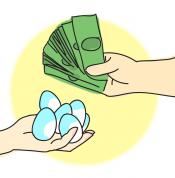News
Adapted from Mitochondrial DNA at
National Human Genome Research Institute
Recently, media outlets around the world have been reporting on...
A newly available kind of genetic testing, called polygenic embryo screening, promises to screen for conditions that can include cancer...
When, in 2004, Woo Suk Hwang claimed to have produced a stem-cell line derived from an embryonic human clone, his...

Marcy Darnovsky, PhD, Associate Executive Director of the Center for Genetics and Society, says:
In women who undergo egg harvesting for fertility purposes, serious adverse reactions, while not common, occur regularly. A few deaths have been reported. It is widely acknowledged that follow-up studies have been inadequate. Judy Norsigian, executive director of Our Bodies Ourselves, notes that:
The authors of the Nature report note that one of the women from whom they obtained eggs for their work produced 26 eggs. Some fertility doctors warn that no more than 10–15 eggs should be extracted from a woman's ovaries in a single cycle, because “when the egg number exceeds 20, the risk of OHSS [ovarian hyperstimulation syndrome] becomes high.”[i]
The authors claim to have followed the guidelines of the American Society for Reproductive Medicine (ASRM), but they did not. For example, they offered a sum of money significantly higher than the ASRM guidelines allow. Nor did they follow the recommendations of the International Society for Stem Cell Research (ISSCR) that “the treating physician or infertility clinician should not also be the investigator who is proposing to perform research on the donated materials.”
Comments Susan Fogel, co-director of the Pro-Choice Alliance for Responsible Research:
The authors speculate that with enough eggs, they might be able to produce genome-specific stem cells. However, they offer no discussion of any exploratory research in animal models. For example, what have been the findings, if any, of animal research seeking to identify the oocyte nuclear factor that they hypothesize?
“We cannot now justify the solicitation of young women to provide eggs for this kind of speculative research,” says Diane Beeson of the Alliance for Humane Biotechnology.
Contact Information:
In the 1990s, scientists, social advocates, policy makers, and entrepreneurs debated the promises and perils of emerging digital technologies that...
The plot of the Marathi-language film “Mala Aai Vhhaychy” (“I Want to Be a Mother”) asks a deceptively simple question...



